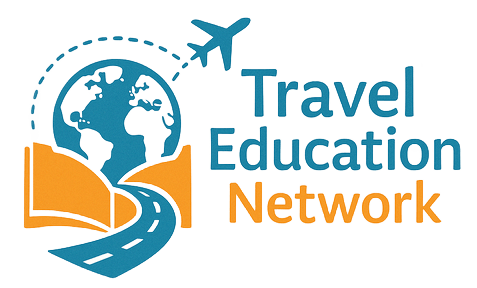Expanding Knowledge Beyond Borders: Why Travel Is Education
Want to transform learning from textbook theory into real-world experience? Educational travel immerses students in diverse cultures, fostering personal growth and broadening perspectives. From navigating bustling markets in Manila to observing international businesses firsthand, travel connects theory and practice. Discover how exploring unfamiliar environments cultivates adaptability, critical thinking, and empathy, preparing you for a globally interconnected future. Embark on a journey of discovery and unlock your potential – explore the transformative power of educational travel today!
Important information

- Educational travel provides real-world experiences that connect theory and practice, leading to increased personal development and cultural empathy.
- It cultivates essential skills like adaptability, problem-solving, communication, and critical thinking by immersing individuals in diverse cultures and environments.
- Travel fosters independence, self-confidence, and resilience by encouraging individuals to step outside their comfort zones and navigate unfamiliar situations.
- Experiencing different cultures firsthand promotes cultural sensitivity, respect, and a deeper understanding of global diversity, leading to a more inclusive worldview.
- Educational travel prepares individuals for a globalized world by enhancing cross-cultural understanding, promoting global citizenship, and building valuable skills for future opportunities.
The Transformative Power of Educational Travel
Educational travel transforms learning by going beyond the traditional classroom and immersing students in cultural experiences that broaden their perspectives and encourage personal growth. Experiential learning connects theory and practice, as shown by programs like Semester at Sea, which demonstrate increased personal development and cultural empathy. Unlike traditional methods, educational travel uses real-world experiences, allowing learning to cross borders and engage directly with diverse cultures and environments.
Benefits of Educational Travel
- Cultivates confidence and equips students with skills to tackle challenges.
- Develops empathy and a deeper understanding of diverse social, political, and economic perspectives.
- Nurtures adaptability, problem-solving, and communication skills.
Real-World Learning
- Offers firsthand experiences impossible to replicate in a traditional setting.
- Encourages continuous learning, expands knowledge, and promotes personal growth and independence.
- Navigating unfamiliar environments enhances self-confidence and cultivates essential life skills.
Stepping outside their comfort zones allows travelers to gain a profound understanding of international challenges, ultimately shaping their worldviews.
This immersive environment fosters skill development and personal growth, providing a unique opportunity to experience and understand diverse cultures.
Transforming the world into a classroom, educational travel allows individuals to learn about diverse cultures, histories, and customs firsthand.
Engaging with locals offers insights into different lifestyles and traditions, enhancing their understanding of global perspectives.
Travel cultivates adaptability and communication skills, and provides practical lessons, including opportunities to learn about conservation and witness the effects of climate change.
These experiences often inspire travelers to become advocates for environmental sustainability, leading to personal growth and independence.
Educational Travel: More Than Leisure
Educational travel offers immersive learning experiences that go beyond the typical vacation, fostering personal growth. It cultivates cultural understanding and boosts adaptability by placing travelers in unfamiliar environments. These experiences also hone problem-solving skills. Connecting with diverse communities builds empathy, strengthens communication, reshapes perspectives, and promotes global citizenship. Furthermore, educational travel bridges the gap between theory and real-world practice, creating invaluable experiences.
The World as Your Classroom: Real-World Education
Real-world education transforms learning by turning the world into a classroom. Through immersive experiences in diverse cultures and environments, travel connects theoretical knowledge with practical application, deepening understanding and fostering critical thinking. Observing international businesses firsthand, for instance, provides invaluable insights. Furthermore, travel cultivates adaptability, preparing students for global challenges while nurturing a sense of global citizenship and promoting cross-cultural awareness. Ultimately, travel transforms the learning process. Here’s how travel enhances education:
Connecting Theory and Practice
Travel bridges the gap between classroom learning and real-world application, making education more meaningful and impactful. Experiencing different cultures and environments firsthand solidifies theoretical knowledge.
Fostering Critical Thinking
Exposure to diverse perspectives and unfamiliar situations encourages critical thinking and problem-solving skills. Students learn to analyze information, evaluate different viewpoints, and form their own informed opinions.
Cultivating Adaptability
Navigating new environments and overcoming unexpected challenges fosters adaptability and resilience. These experiences prepare students for the complexities of a globalized world.
Promoting Global Citizenship
Travel cultivates a sense of global citizenship by exposing students to different cultures, fostering empathy, and broadening their understanding of global issues. This promotes cross-cultural awareness and respect.
Cultural Enrichment Through Travel
Travel is an immersive experience that opens your mind to a world of different cultures. By experiencing local traditions firsthand, you learn about unique customs and social norms, fostering cultural sensitivity and respect. Direct interaction with people from diverse backgrounds broadens your perspective and deepens your understanding of global diversity. Travelers develop empathy and an appreciation for different ways of life, promoting a more inclusive worldview. Connecting with locals and participating in their cultural practices enriches your travel experience, giving you a greater appreciation for our interconnected world. Ultimately, travel transforms your perspective and builds bridges between cultures.
Immersive Learning: Experiencing Different Cultures
Immersive learning offers a powerful way to connect with different cultures. For example, visiting Manila’s Cultural Center of the Philippines allows you to engage directly with local traditions and experience cultural practices firsthand, fostering respect, understanding, and empathy. Food tours provide another avenue for immersive learning, where trying Filipino dishes like adobo and sinigang enhances cultural awareness. These experiences not only deepen learning beyond traditional methods but also broaden perspectives and promote global citizenship.
Broadening Perspectives: Understanding Diverse Cultures
Traveling offers invaluable opportunities to learn about different cultures and gain new perspectives. By experiencing diverse political systems and social structures firsthand, you develop a deeper understanding of how societies function and address challenges. This cultural immersion fosters critical thinking and empathy, enriching your global outlook. For example, encountering different political systems can challenge your existing beliefs about governance. Similarly, experiencing new social norms can broaden your understanding of societal issues. These experiences contribute to a more informed and nuanced worldview, promoting personal growth and cross-cultural understanding.
Cultural Immersion and Sensitivity: Respecting Local Traditions
Immersing yourself in a new culture fosters respect for local traditions, broadening your perspective and enhancing cultural sensitivity. Experiencing customs firsthand, like a Japanese tea ceremony or a vibrant Brazilian festival, cultivates understanding and empathy. This offers valuable insights and forges authentic connections with people and their heritage. Respecting these traditions is vital for meaningful cultural exchange and fuels personal growth during your travels.
Cross-Cultural Benefits: Authentic Connections and Global Citizenship
Traveling to new places and experiencing different cultures allows you to connect with people from all walks of life in a truly authentic way. These immersive experiences help you develop empathy and break down stereotypes. When you travel, you gain a sense of global citizenship, recognizing our interconnectedness and shared humanity. Cross-cultural collaboration becomes essential, broadening your perspectives and encouraging global engagement. This, in turn, inspires us to build a more connected and understanding world.
Educational Benefits of Travel
Educational travel transforms textbook knowledge into real-world experiences, bridging classroom lessons with tangible situations for deeper understanding. Comparative learning across diverse locations offers unique insights into various educational systems, allowing students to observe different teaching approaches firsthand. Language immersion dramatically improves communication skills through authentic practice with native speakers. Environmental education becomes far more impactful as direct observation of ecosystems builds sustainability awareness and fosters a deeper understanding of our planet’s challenges. Exploring different cultures firsthand promotes adaptability and cross-cultural understanding, essential skills in today’s interconnected world. Finally, educational travel fosters personal growth, boosting self-confidence and independence as students navigate new environments and challenges.
Experiential Learning: Connecting Theory to Reality
Experiential learning bridges the gap between textbook theory and practical application, transforming abstract concepts into tangible actions. Students gain invaluable firsthand experience. For instance, business students might observe international markets, developing a deeper understanding of global commerce. This active approach cultivates critical thinking and problem-solving skills, leading to improved knowledge retention and better preparation for real-world challenges.
Comparative Learning Across Global Landscapes
Comparative learning offers a valuable lens for examining education systems worldwide. By exploring teaching methods and curriculum structures across different countries, we can identify best practices and understand diverse learning styles. This process also fuels the development of innovative educational approaches. Analyzing factors like educational policies, student performance, and cultural influences provides insights that can improve education globally.
Comparing how different nations emphasize STEM subjects can reveal effective strategies for promoting scientific literacy.
Examining vocational training models across borders can highlight solutions for addressing workforce skill gaps.
Furthermore, comparative learning fosters crucial cross-cultural understanding and collaboration among educators and policymakers internationally.
Language Learning: Improving Communication Skills
Traveling provides incredible opportunities to hone your language skills. Conversations with native speakers enhance both fluency and comprehension, offering invaluable real-world practice. Moreover, immersion in a new culture deepens understanding, a crucial element of effective communication. Everyday tasks, like ordering a meal or asking for directions, reinforce vocabulary and grammar, proving that learning by doing is truly effective.
Environmental Education and Sustainability Awareness
Educational travel fosters environmental awareness by immersing participants in diverse ecosystems. Witnessing the impact of human actions and climate change firsthand often inspires travelers to adopt sustainable practices and support conservation efforts. Eco-tours and field studies, for example, educate participants about preserving natural and cultural heritage. This experiential learning bridges the gap between theory and practice, promoting responsible travel and encouraging global citizenship.
Personal Growth and Development
Stepping outside your comfort zone fosters independence and adaptability. Exploring unfamiliar cultures hones your resourcefulness and problem-solving skills, boosting your confidence. Interacting with diverse people sharpens interpersonal skills, while travel itself fuels personal growth, cultivating self-reliance and resilience. Ultimately, these experiences broaden your understanding of both yourself and the world.
Stepping outside your comfort zone fosters independence and adaptability.
Exploring unfamiliar cultures hones your resourcefulness and problem-solving skills, boosting your confidence.
Interacting with diverse people sharpens interpersonal skills.
Travel itself fuels personal growth, cultivating self-reliance and resilience.
Ultimately, these experiences broaden your understanding of both yourself and the world.
Stepping Out of Comfort Zones: Fostering Independence and Adaptability
Stepping outside your comfort zone fosters independence and adaptability. Navigating unfamiliar cultures hones your problem-solving skills and resourcefulness, boosting confidence and resilience. These qualities are crucial for personal and professional growth. Travel cultivates flexibility and open-mindedness, preparing you for our interconnected world. Overcoming challenges in new environments also deepens self-awareness and provides a richer understanding of yourself and the world around you.
Stepping outside your comfort zone fosters independence and adaptability. Navigating new cultures enhances problem-solving skills and resourcefulness. This builds confidence and resilience, essential for personal and professional growth.
Travel cultivates flexibility and open-mindedness, preparing you for our interconnected world. Overcoming challenges in unfamiliar environments deepens self-awareness. It also provides a richer understanding of yourself and the world.
Enhancing Confidence and Interpersonal Skills
Educational travel cultivates confidence by pushing you to navigate unfamiliar situations and solve problems independently. Interacting with diverse individuals enhances adaptability and communication skills, fostering empathy and building stronger relationships. These experiences nurture self-reliance and resourcefulness, ultimately boosting self-esteem and strengthening overall confidence.
Resourcefulness and Problem-Solving Skills
Traveling on unfamiliar public transport systems can make you more resourceful. Managing your money in a foreign currency has the same effect, as does adapting to unexpected situations. Overcoming language barriers and navigating new routes or logistical puzzles also boosts your problem-solving abilities. Ultimately, these experiences cultivate adaptability and resilience. Here’s how travel enhances your resourcefulness:
- Navigating public transport: using unfamiliar public transport systems in new cities enhances your ability to plan, adapt, and problem-solve on the fly.
- Managing foreign currency: handling foreign currency strengthens your budgeting skills and financial awareness.
- Adapting to unexpected situations: travel inevitably throws curveballs, and responding to these unforeseen circumstances builds your resilience and adaptability.
- Overcoming language barriers: communicating in a foreign language, even with basic phrases, improves your communication skills and confidence.
- Navigating new routes: finding your way in unfamiliar environments sharpens your navigational skills and spatial awareness.
Building Global Connections and Perspectives
Global citizenship thrives on interconnectedness, fostered by international exchange and study abroad programs. These programs equip students with essential global perspectives, preparing them for future challenges and opportunities.
Travel offers invaluable real-world education, bridging the gap between theory and practice. It also hones communication skills and promotes environmental awareness.
Travel fosters adaptability, building confidence and resourcefulness. U.S. schools are integrating global perspectives into their curricula through diverse materials and classroom discussions.
The growth of global travel cultivates a more interconnected and culturally aware student body. This prepares students for a globalized workforce by developing crucial skills like adaptability, cultural intelligence, and effective communication.
Global Citizenship: Embracing Interconnectedness
Travel has become essential to navigating our interconnected world, transforming global citizenship from a concept into a reality. Exploring diverse cultures and perspectives provides firsthand experience with global issues, fostering responsibility and connection within the international community. Travel acts as experiential learning, deepening our understanding of global dynamics and promoting cross-cultural awareness. Adaptability and cultural intelligence are crucial in today’s global workforce, and travel cultivates these skills. Travel fosters international understanding and cooperation, bridging cultural divides and promoting a more interconnected world.
International Exchange and Study Abroad Programs
International exchange programs foster cross-cultural understanding by allowing students to experience different cultures firsthand. Studying abroad immerses them in new academic environments, broadening their horizons with global perspectives.
- Often, these programs incorporate language learning, which further enhances communication skills and cultural awareness.
- Hosting international students creates genuine connections and promotes global citizenship.
- Educational travel, encompassing study abroad, cultural exchanges, and language immersion, caters to diverse interests and age groups. These invaluable experiences cultivate personal growth and a deeper understanding of the world.
Participating in international exchange programs offers numerous benefits:
- Enhanced Cross-Cultural Understanding: Experience different cultures firsthand.
- Global Perspectives: Broaden your horizons through new academic environments.
- Improved Communication Skills: Language learning opportunities enhance cultural awareness.
- Personal Growth: Cultivate a deeper understanding of the world.
Preparing for Global Challenges and Future Opportunities
Travel cultivates adaptability and boosts cultural intelligence, valuable assets in today’s interconnected job market. Experiencing diverse perspectives broadens horizons, while navigating unfamiliar situations enhances problem-solving skills and prepares individuals for future career opportunities. International travel fosters a global mindset, illuminating global connections and equipping one to handle complex challenges. This experience also promotes innovation, collaboration, and competitiveness in diverse work environments.
Global travel fosters interconnectedness and increases cultural awareness among students, creating more diverse classrooms that reflect our complex world. As classrooms become microcosms of global society, educators must prepare students to navigate different cultures, underscoring the growing importance of global education.

















